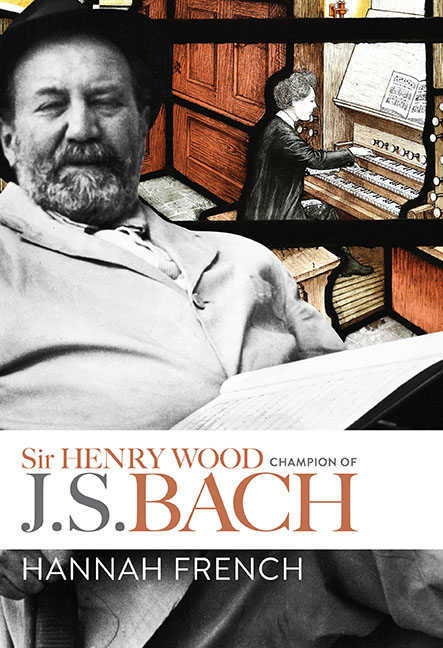Book contents
- Frontmatter
- Dedication
- Contents
- List of Illustrations
- List of Music Examples
- List of Tables
- Prologue
- Acknowledgements
- List of Abbreviations
- PART I CONTEXTUALISING
- Introduction: Wood's Role in the English Bach Revival
- 1 Bach in Pre-Proms England
- PART II PROGRAMMING
- PART III INTERPRETING: ORCHESTRAL WORKS
- PART IV INTERPRETING: VOCAL WORKS
- PART V INFLUENCING
- APPENDICES
- Bibliography
- General Index
- Index of Works by J.S. Bach
Introduction: Wood's Role in the English Bach Revival
from PART I - CONTEXTUALISING
Published online by Cambridge University Press: 07 September 2019
- Frontmatter
- Dedication
- Contents
- List of Illustrations
- List of Music Examples
- List of Tables
- Prologue
- Acknowledgements
- List of Abbreviations
- PART I CONTEXTUALISING
- Introduction: Wood's Role in the English Bach Revival
- 1 Bach in Pre-Proms England
- PART II PROGRAMMING
- PART III INTERPRETING: ORCHESTRAL WORKS
- PART IV INTERPRETING: VOCAL WORKS
- PART V INFLUENCING
- APPENDICES
- Bibliography
- General Index
- Index of Works by J.S. Bach
Summary
‘What time I had for myself I gave to the study of Bach.’ A bold statement, and one which perhaps does not chime with the usual image of Sir Henry J. Wood – lengthy baton outstretched in front of a large symphony orchestra at the Promenade Concerts. Wood's ultimate legacy was ‘The Proms’, a summer festival that not only created a ‘new epoch in English musical life’ at the turn of the twentieth century, but changed the social and cultural parameters of concert-going in Britain. A remarkable musician by any standard, he worked at the highest level with the greatest artists of his day and established concert programmes of the works of living composers alongside classical repertoire. He was a conductor with a voracious appetite for ‘new’ repertoire to fill nightly concerts and attract new audiences, whether from the neglected ‘ancients’, the French Impressionists, the Second Viennese School, or contemporary British composers. Over 700 works by more than 350 composers given Proms premieres under his baton attest to his ambition and success as an orchestral experimenter and tireless promoter of new music.
But what of a campaign on behalf of Johann Sebastian Bach? Was this part of his constant yearning for new repertoire or something more personal? Should Bach be regarded on a pedestal above his other passions: the promotion of Russian or British music or the popularisation of Wagner or Sibelius? While Lady Jessie Wood claimed: ‘Henry did not restrict his horizon by concentrating on a favourite composer’, she conceded that there were favourite works: ‘I can definitely say that Bach's Brandenburg Concerto No. 6, especially the slow movement, was singled out as such.’ This admission is the key to unlocking a particular preference and resulted in his championing Bach's orchestral repertoire.
That Wood does not feature in recent scholarship regarding the English Bach revival is perhaps not surprising: his archive of scores has, until recently, been largely undisturbed. No estimation could fully be made of Wood's commitment to Bach without the study of his vast collection of scores and orchestral parts. Marked-up published scores and unpublished manuscripts in his hand, or that of an assistant, reveal the extent of his assiduous, obsessive approach, and through them he emerges as an innovator, educator, disciplinarian, and administrative workaholic for the sake of his art.
- Type
- Chapter
- Information
- Sir Henry Wood: Champion of J. S. Bach , pp. 3 - 8Publisher: Boydell & BrewerPrint publication year: 2019



